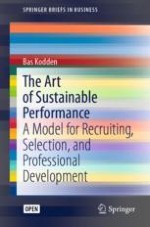This open access book revisits common notions on how to select and recruit the right employees. It reveals that the secret of successful individuals and teams lies in a combination of talent and four important performance indicators, offering an innovative approach that companies can fruitfully adopt.
Bas Kodden has studied key performance indicators among over 1,100 executives, senior staff and professionals, including 50 CEOs from leading Dutch companies. His findings put the present recruitment and selection procedures used by many prominent companies in a new light. Moreover, the book not only addresses theory; it also offers a practically applicable model for recruitment, selection and professional development. In closing, the book includes a variety of questionnaires and checklists for HR professionals and executives whose goal is to build sustainable and successful teams and organizations.
